The thought of maple trees may conjure up an image of majestic fall color or delicious, sweet syrup. You may even picture the “helicopters” that flutter down from the branches in summer or fall.
What most people don’t realize about maple trees, however, is that there are fantastic health benefits packed into the sap, leaves, and even the bark.
In fact, compounds from maple trees are currently being researched in numerous ways because of their incredible potential. They have already shown anti-aging power for both body and skin and likely have more yet-to-be-uncovered benefits.
Here’s more about the hidden “superpowers” of maple trees that are starting to emerge.
Maple Trees: More Than Just a Pretty Picture
Maple trees (Acer spp.) are one of the most common types of tree. There are nearly 130 different species of maple, from the smaller Japanese maples to the grand red and sugar maples. They grow primarily in the northern hemisphere, particularly in the eastern part of North America, East Asia, and Europe.
Like other native trees, maples are a very important source of food and shelter for wildlife. They have also played a big role in traditional medicinal practices, even though the benefits of maple are considered a “new” discovery.
Most notably, maple has featured in East Asian and Native American medicine.
The entire tree (leaves, bark, shoots, etc.) was considered valuable and used for various health issues like rheumatism, eye infections, bruises, and nervous conditions. The leaves were even made into a tonic to detoxify the body and support liver and spleen health.
More recently, researchers have discovered even more potential benefits by studying various extracts from the trees. The results so far have been very surprising…
A Look at the Benefits of Maple Syrup
What is Maple Syrup?
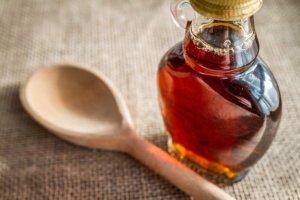
Maple syrup is one of the most familiar products of maple trees. It’s made from the sap of the trees that gets boiled down until very little water content remains. The end product is a thick, sweet syrup that is classified as Grade A or Grade B based on its color (Grade B is the darkest).
Surprisingly, maple syrup retains many nutrients and plant compounds in spite of the fact that it gets exposed to a lot of heat during processing.
Nutrient Content
One of the biggest differences between maple syrup and refined cane sugar is that maple provides your body with nutrients.
For example, just one tablespoon of maple syrup contains about 33% of the daily value (DV) for manganese. Manganese is a mineral that is critically involved in many processes within the body: blood clotting, calcium absorption, brain function, blood sugar regulation, and more. It’s also a component of superoxide dismutase, an antioxidant enzyme that fights free radicals.
Along with manganese, maple syrup is particularly rich in zinc and contains good amounts of iron, potassium, and calcium.
Lower Glycemic Index than Refined Sugar
Glycemic index is a measure of how much a specific food may increase your blood sugar. The lower the number (on a scale of 0-100), the less of an impact a food is likely to have on blood sugar levels.
Another of the benefits of maple syrup over sugar is a lower glycemic index (GI). Maple syrup scores about a 54, which is considered a low range GI rating. Sugar comes in at about a 65, which is on the high end of a medium GI rating.
This indicates that maple syrup raises blood sugar levels more slowly than cane sugar.
Full of Antioxidants
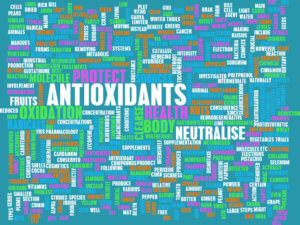
Not only does maple syrup provide nutrients, it also contains at least 24 different antioxidants. Consuming a variety of antioxidants is one of the best things you can do to keep your mind and body healthy as you age, since they fight free radical damage at the cellular level.
One very fascinating study found that maple syrup was lower on antioxidant capacity than blueberry juice but comparable to other fruit juices like strawberry and orange. Also of note was the fact that darker colored syrups had more antioxidant power than lighter ones.
Even better, the same study found that pure maple syrup had “selective in vitro antiproliferative activity against cancer cells,” which is incredible!
Contains Health-Boosting Compounds
There are many different compounds in maple syrup (some antioxidant, some not) that have specific health benefits.
As already mentioned, certain compounds (like quebecol) have shown an ability to slow cancer cell growth in lab studies. Others may slow the digestion of carbohydrates, which could contribute to better blood sugar regulation.
Astonishingly, phenolic compounds in maple syrup have also shown potential for preventing Alzheimer’s disease. A preliminary study found that they decreased both oxidative stress and inflammatory markers in the brain. They also reduced peptide clumping that can lead to Alzheimer’s and had similar neuroprotective effects to resveratrol, a very powerful antioxidant.
The Bottom Line: Highly Beneficial— In Moderation
By now you can see that maple syrup is far superior to refined sugar (and, of course, artificial sweeteners). That being said, the syrup is still about 2/3s sugar, so you don’t want to be consuming large amounts of it.
However, maple syrup can be very beneficial if used instead of “empty” sugar. In fact, one study concluded that replacing refined sugar with a sweetener like maple syrup could increase your daily antioxidant content by an amount equal to eating an extra serving of berries or nuts!
Emerging Benefits of Maple Water
What is Maple Water?
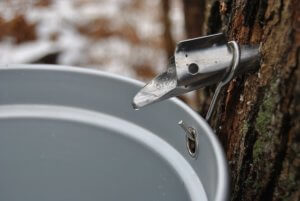
Maple water is the name for pure maple sap that hasn’t been boiled down into syrup. It gets tapped directly from the trees, is pasteurized or sterilized, and then gets bottled.
The sap has a very high water content, which is how it got the name maple ‘water’. However, it still has a little bit of sweetness to it and a hint of maple flavor.
In spite of the pasteurization process, maple water can retain many beneficial compounds and nutrients. But be sure to look for a brand that uses gentle pasteurization/sterilization methods to ensure it stays as pure and potent as possible.
Hydration + Carb Boost
Maple water is made up of about 98% water and 2% sugar. This means it helps to hydrate your body and provides a small carbohydrate boost without being sugar-laden or artificial— like many sports drinks are.
Of course, for everyday hydration, pure water is usually the best choice. However, for heavier workouts or athletic events, carbohydrates provide a needed energy source. Maple water won’t replace a healthy carb snack, but it can help you fuel up when you hydrate during a workout.
The small amount of sugar in maple water may also help those who experience a blood sugar drop during exercise.
Contains Electrolytes
There may be further benefits of maple water as a post-workout drink because it contains electrolytes.
Electrolytes are important minerals that carry an electrical charge. They have many essential roles, including supporting nerve and muscle function, and are lost from your body when you sweat. Replenishing them after exercise is key, particularly because they are needed for proper hydration.
The good news is you don’t have to turn to artificial sports drinks to get electrolytes. Maple water (much like coconut water) naturally contains electrolytes, including calcium, magnesium, and potassium to hydrate and replenish.
Boosts Your Antioxidant Intake

Maple water doesn’t contain quite the same antioxidant content as maple syrup because it’s less concentrated. But it may still give your body a noticeable antioxidant boost according to one study.
The 2019 study compared the hydration effects of real maple water versus a control group of maple-flavored plain water. It found that both were equally effective at rehydration post-workout BUT the maple water had a much greater antioxidant potential (AP), which also raised the AP of participants’ urine after drinking it.
Like maple syrup, maple water also contains manganese, which helps form the antioxidant enzyme superoxide dismutase— a key free radical neutralizer.
May Help Stabilize Blood Sugar Levels
Both maple syrup and maple water contain a phytohormone (plant hormone) known as abscisic acid (ABA) that may have benefits for blood sugar control.
Preliminary findings indicate that ABA helps the body to maintain healthy blood sugar levels. It also appears to improve insulin sensitivity, in part by decreasing systemic inflammation. These findings are extremely promising, since high blood sugar and insulin resistance are two hallmarks of type 2 diabetes.
Interestingly, ABA is produced in plants as part of a defense mechanism against external stressors. It can be found naturally in certain fruits and vegetables— and, of course, maple sap.
May Reduce Inflammation
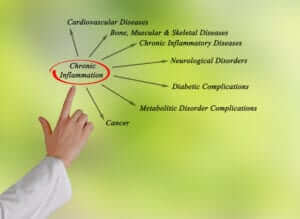
As you may know, consuming a range of antioxidants is key to fighting chronic inflammation. They help to neutralize free radicals and prevent damage to cells and tissues that may lead to the type of inflammation that contributes to disease.
Not only does maple water contain at least 24 different antioxidants (just like maple syrup), it also contains a specific antioxidant compound known as quebecol. Named after Quebec, a major maple syrup producer, quebecol has specifically demonstrated anti-inflammatory effects in studies.
The extent of maple water’s inflammation-fighting power is still unknown, but it clearly has a positive effect on the human body.
The Bottom Line: Excellent, Health-Boosting Hydration
Pure, toxin-free water is still the best hydrator, but the extra health boost you get from maple water is also valuable. Particularly if you exercise often, your body can make good use of the electrolytes, antioxidants, and nutrients that maple provides.
When compared to maple syrup, maple water is not as concentrated in nutrients or antioxidants, but it is much lower in sugar. Overall, it’s an excellent replacement for sports drinks and is more sustainable to produce that some other natural beverages, like coconut water.
(NOTE: You can search online for “organic maple water” and you can find maple water in many stores now, including some major “big box” retailers.)
Anti-Aging Skin Benefits of Maple Leaf Extract
What is Maple Leaf Extract?
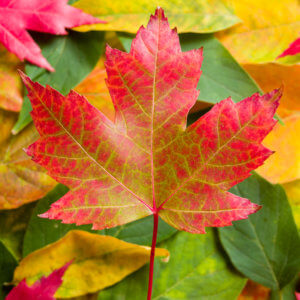
Maple leaf extract is a relatively new find. While the leaves of maple trees have seen use in Native American medicine, researchers only recently began to take concentrated extracts from the leaves to study.
Their findings brought great news for natural skincare enthusiasts: Compounds in the leaves may protect the elasticity of skin and slow the aging process.
So far, red maple leaf extract has been the most studied, but it’s likely that extracts from other maple species will prove to be powerful in their own ways.
Protecting the Valuable Elastin in Your Skin
You’ve probably heard of collagen— the vital protein that helps keep skin plump and wrinkle-free. Well, there’s another equally important protein known as elastin that is critical for youthful-looking skin.
You can think of elastin as the “anti-sag” protein. It keeps your skin elastic, able to bounce back from being stretched. When it starts to decline, your skin becomes visibly saggy, loose, or droopy and wrinkles form much more easily.
One of the main reasons elastin declines as you get older is the activity of an enzyme known as elastase. Elastase is what breaks down elastin, leading to many frustrating visible signs of aging.
But now for the good part…
Researchers discovered that there are benefits of maple leaf extract for inhibiting elastase. Key compounds in red maple leaf, known as glucitol-core-containing gallotannins (GCGs), may be able to actually block the activity of elastase.
This means that they can help to protect the precious elastin in your skin, fending off the appearance of wrinkles and other signs of aging— a huge finding, since there are few known elastin-boosting skincare ingredients.
May Reduce the Appearance of Inflammation & Dark Spots
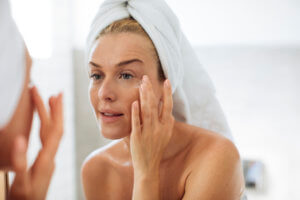
Maple leaf extract has even more power for younger-looking skin. Research connected to the studies on maple and elastin revealed that the glucitol-core-containing gallotannins (GCGs) in the leaves may also be able to brighten skin tone.
Specifically, GCGs appear to have the ability to help protect your skin from inflammation and reduce the appearance of dark spots. This includes what are commonly called ‘age spots’ as well as hyperpigmentation that may be leftover from something like acne.
As a bonus, researchers believe maple leaf extract also has anti-wrinkle power. In fact, studies are currently underway to evaluate its effects on fine lines, wrinkles, etc.
Antioxidant Power that Protects Skin
The stars of maple leaf extract— glucitol-core-containing gallotannins (GCGs)— have shown powerful antioxidant activity in studies. They also demonstrated an ability to protect human keratinocytes, the cells that make up most of your outer layer of skin.
This is extremely good news for anti-aging skincare. Antioxidants are key to stopping free radical damage that may accelerate the aging process. They also help protect both collagen and elastin in your skin and provide protection from UV damage (a major age-accelerator).
The Bottom Line: A Revolutionary Skincare Ingredient
A decade ago, the outstanding benefits of maple leaf extract for skin were virtually unknown. Thanks to recent studies, it’s now poised to become one of the top natural elastin-boosting skincare ingredients.
Perhaps the best part of the story is how sustainable maple leaves are as a skincare ingredient. They can easily be harvested without damage to the tree, yet have as much anti-aging potential as more exotic ingredients.
Be sure to look for an organic version of maple leaf extract to ensure you aren’t applying toxic chemicals to your skin.
Maple Leaf Extract for Younger-Looking Skin

If you want to harness the incredible benefits of maple for skincare, look into the Age-Defying Dream Cream from Purity Woods.
This USDA Certified Organic cream contains three different maple leaf extracts, including the powerful red maple extract. It also has over 20 other top botanical ingredients that deeply moisturize skin and quickly erase the appearance of fine lines, wrinkles, age spots, etc.
Learn more about the Age-Defying Dream Cream here and incorporate more maple into your life!

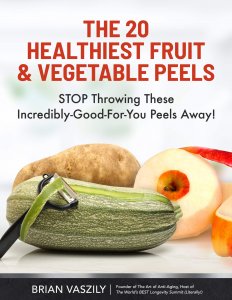

It looks good, but, unfortunately for me, in Brazil we don’t have the trees that you in the Northern hemisphere have, so it’s out of bounds for me, because I am unable to buy anything that comes from the US! Otherwise I might like to order! Thank you!
Tine
I purchased Purity Woods face cleanser, dream cream, hyper-lift serum, and age-defying eye cream. I wish I had taken “before” pictures because after 2 weeks I TOTALLY notice a difference in my face and hands!!! Thank you!
Will you have any more specials on these? I have a friend who wants to check it out.🥰
Hello Brian: Many thanks for all the wonderful, and great information I have been reading on your Websight. I do use your ADDC, at least 4 days per week, and I use other great creams. As for Honey, I do take a spoonful each morning before swimming which I do 4 days a week from 5:00am to 6:45. I feel fresh beet juice has far more energy properties, than any other juices I have used. Honey, I can’t help myself, always in my kitchen cabinet, use many times to replace either raw sugan, or processed sugar. Now, after reading about Maple water, you can bet I’m going to go after the best I can find. What I really need at this time, is a
excellent Face cleanser. What is it a good product, or can you help me locate a better one than I use?? At this time use Aveeno Micellar Gel cleanser. Ok, I leave it up to you to help me find another product or hopefully, better facial cleaner. Thank you for all the wonderful, interesting, educational information.
Thank you for sharing your research on the virtues of maple. I agree that maple syrup is good for us as a sweetener when we need one… I find it easier to digest.
My uncle lived to be 96 and his mind was remarkably sharp. He would eat a piece of home made pie topped with some maple syrup every day. He didn’t have a health condition all the way to the end.
I have been using the IDDC for a while and it is very gentle on the skin, improves elasticity and leaves a nice glow… and is has a very nice subtle scent.
Thank you for your dedication!
I love the Age Defying Dream Cream!! I’m 80 years old and my skin looks like I’m in my 50s.
Thank you for this article! I agree about the value of Maple syrup and enjoyed learning about the other mighty products available from that tree.
I realize this deviates somewhat from the point of the article, but there WAS a glaring omission–the MARVELOUS EYE-CANDY of the maple tree is truly therapeutic! I had the privilege of enjoying a forest of maples and oaks from my back porch almost every morning for 30 years. The psychological and emotional healing from that tasty candy in times of stress–year-round, but of course especially in the autumn–is amazing!
We have a maple forest in central Alberta Canada. Only one I know of. Amazing tree, grows several feet a year. Some may have planted one from the east years ago, and we now have 10 acres of them. When they get around 70 ft. high they just fall over, which takes another 10 years. This article has given me other ways to look at our trees, as we’re about to grow several hundred more on the 80 acres. As long as our foolish prime minister doesn’t take it all from us. Alberta is in the ‘land grab’ scene right now. Coming your way US. Stand tall with us! Feb. 1, 2023
I always use maple syrup or honey in place of sugar and it makes baked good more moist. Looking forward to getting my first shipment of your eye cream and dream cream.
The Maple leaf forever…….!
p.s. botanicals from Ginko trees.. also have plenty of health benefits, too……
Thank you Brian for your generous sharing of information worth worthy purpose. Recently received the 7day health anti-aging summit…which is marvellous and applicable. I’m using the lifting serum and Dream cream! I’m 69 yrs with very deep wrinkles and the durum and Dream cream has my skin looking fresher and glowing and distracts from the deeper lines. Less sag too. 🍁 Maple syrup I add to salad dressing ~ years ago a friends 11 yr old would not eat salad yet loved mine so his daily food intake was revonlusionised! So appreciate your divine contributions to global all around health 💓 EE Australia
thank you for the information. I always enjoy learning something new. question, do you only get maple syrup and maple water from sugar maples or can you tap any maple? thank you
Here in VT, maple is the food of the gods, so it’s no wonder that it’s a “health” food. We make the best maple syrup on the face of the Earth!!!!
as you always do, you encourage me with your very useful health prompts to steer us allin the right direction I really miss your jokes “daddo” as my grandsons= great little guys, call jokes thanks Brian
I learned a few new things! Thx for the time you put into this thoughtful article!
Thank you you Brian for this very interesting article and Dad joke😂. When I saw quebecol I thought oh It’s a cool coincidence, maple syrup being Canadian but then I read further and realised it is named after Quebec!😀 I have always enjoyed maple syrup but have switched to using small amounts in baking instead of regular sugar since my husband has been diagnosed with type2 diabetes. But have read some articles which have said that there’s hardly any difference between maple syrup and straight sugar.
This article has convinced me that because of all the other benefits of maple syrup I will continue to use it in moderation . I have never seen maple water for sale( I live in France).
Thanks for the Maple info. We had a small maple grove on our property when I was a child & my father made syrup every spring. Didn’t know all this other stuff. Great article. Enjoy your Dad jokes.
Just 2 words for you : T H A N K Y O U